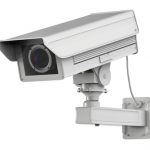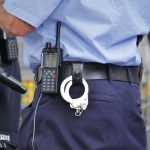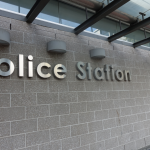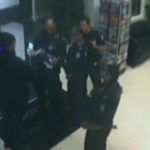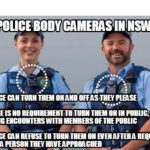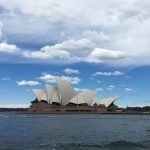Uber-Driving Lawyer Challenges Bully Cop
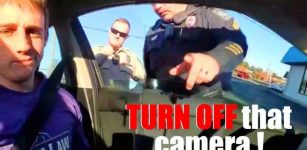
A criminal defence lawyer who was moonlighting as an Uber driver has filmed police trying to intimidate him and falsely claiming he was not allowed to film their encounter.
North Carolina lawyer Jesse Bright was pulled over by police on 26 February 2017 after picking up a passenger from an alleged drug house.
He filmed the incident on his smartphone despite police telling him that it was against the law to do so. Mr Bright has since posted the footage on his Facebook page, and it has gone viral.
In the video, police say: “Hey bud, turn that off, okay?” referring to Mr Bright’s smart phone.
“No, I’ll keep recording. Thank you. It’s my right,” Mr Bright replies.
Intimidation and name calling
The exchange escalates, with one officer telling Mr Bright that he is “being a jerk” and another threatening to “take you to the jail” if he continues filming.
Mr Bright was sitting in his car surrounded by five officers, and told police he would keep filming because he felt intimidated and “scared”, and in case “anything happened”.
Police eventually searched Mr Bright’s car with the assistance of a K-9 ‘sniffer dog’ and, although Bright was not arrested, his passenger was.
Bright has also posted a document he received in response to the incident from the New Hanover County Sheriff’s Office.
Officers in the wrong
The document confirms that officers were in the wrong when they told Bright he could not film them, and that he had every right to do so.
The statement proceeds to state that the Sheriff’s Office actively encourages citizens to record encounters with police.
The increased use of camera phones and the fact that footage can be uploaded to social media almost instantaneously can help to keep officers accountable for their actions. The footage can also be used to support a complaint or contradict a police claim of unlawful conduct.
In New South Wales
There is no law in NSW against filming police in public – including from within a car that is in a public place – so long as you don’t hinder their ability to carry out their duties.
And police do not have the right to delete footage, photos or other data from personal devices. In fact, they may be prosecuted for attempting to pervert the course of justice if they destroy relevant evidence, or face proceedings for assault or trespass to the person if they forcibly confiscate recording devices without sufficient cause.
Sometimes, police will attempt to intimidate members of the public into ceasing filming by claiming it is illegal to record audio. Indeed, section 7 of the Surveillance Devices Act 2007 makes it an offence to knowingly install, use or cause to be used or maintain a listening device to overhear, record, monitor or listen to a private conversation to which the person is not a party, or to record a private conversation to which the person is a party.
However, there are several important exceptions to this rule – including where a ‘principal party’ consents and the recording of the conversation:
- is reasonably necessary for the protection of the lawful interests of that principal party, or
- is not made for the purpose of communicating or publishing the conversation, or a report of the conversation, to persons who are not parties to the conversation.
A ‘principal party’ is defined as “a person by or to whom words are spoken in the course of the conversation”.
NSW police policy
The NSW Police Force media policy makes it clear that “members of the public have the right to take photographs or film police officers which are observable from a public space or from a privately owned place with the consent of the owner or occupier…”.
In the context of the Surveillance Devices Act, the policy states:
“Camera footage taken from a public place, or a privately owned place with the consent of the owner/ occupier, does not contravene the Surveillance Devices Act 2007. The footage can be taken in these circumstances even if the crime scene or activity itself is not in a public place…”.
“Conversations held openly in public places, where the parties to the conversation should reasonably expect that it might be overheard by someone else, are generally not considered to be ‘private conversations’ and so are not protected by the Surveillance Devices Act 2007.”
Deleting incriminating footage
There have been several incidents where police have confiscated recording devices and allegedly deleted incriminating footage.
In one incident, a former Federal police officer was approached and surrounded by five officers in the lobby of an apartment building on the Gold Coast. He took out his phone and began filming the encounter, at which time police confiscated his phone and began to “play with it”. The former officer says police deleted the footage of the encounter from his phone, perhaps not knowing the incident was being recorded by a nearby CCTV camera.
The man has made a formal complaint which is currently being investigated by the Queensland Police Service.
Fining police for deleting footage
In Colorado, law makers are proposing to impose civil fines of up to $15,000 upon officers who confiscate phones, delete footage or threaten members of the public – and the fines are to be payable by the offending officers personally, rather than by the taxpayer.
Those who support the move believe it could deter officers from engaging in such unacceptable conduct, and make police more accountable for their actions.
There are no plans to introduce such laws in Australia.



